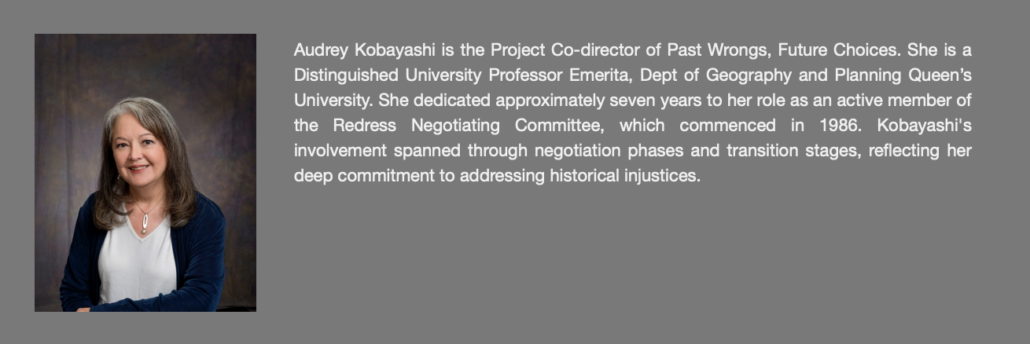Fall 2024 Project Director’s Message from Audrey Kobayashi
Nearly 50 years ago, in 1976, Ken Adachi published The Enemy that Never Was: A History of the Japanese Canadians (McClelland and Stewart). I was a master’s student at UBC, recently embarked upon a journey of discovery that was partly academic, partly personal, wholly caught up in both the wonder and the shock of the experiences that members of my community, including my father, could not forget but did not wish to remember. I purchased my hard copy of the book and immediately became lost in the facts, figures, and prose related by a consummate storyteller whose passion for justice was matched by his fervent desire to tell the truth. The book made my studies make sense; and pacified my then naive and romanticized notion of what it meant to be Canadian.
A year later, in 1977, Japanese Canadians celebrated the centennial of what was believed to be the arrival of the first Japanese immigrant to Canada. A small but dedicated and influential group from the National Japanese Canadian Citizens Association, which had originally commissioned Adachi’s book, worked cross the country to foster support for the celebration and to make widely known their message that their history and their dedication to full and unfettered citizenship should not be forgotten. The culmination of that year was the first Powell Street Festival, which I celebrated fervently, and at which I gained a new perspective: our history was not only to be celebrated but to be redeemed. I attended a meeting of Sansei and a few Nisei at Aki Restaurant on Powell Street, where the incipient redress movement was gaining strength. The next decade was sometimes tough, sometimes exhilarating, as we strive for our redress and acknowledge.
None of the subsequent events could have been the same without Ken Adachi’s wonderful book. Over the next decade, as the redress movement gained strength, we turned again and again to its pages to support the facts that we brought before the government, for nowhere else was the JC experience so expertly detailed. The book was an inspiration; its truth was compelling.
Recently I picked up the copy that I purchased for $14.95 in 1976. It still has its dust jacket, much battered, and it is filled with slips of yellowed paper on which I have written notes over the years. It reminds me of the enduring contribution that Ken Adachi made, not only to Japanese Canadians, but to all who oppose the virulent racism that our community experienced, and who cherish the sense of social justice that he epitomized.


 Instagram
Instagram